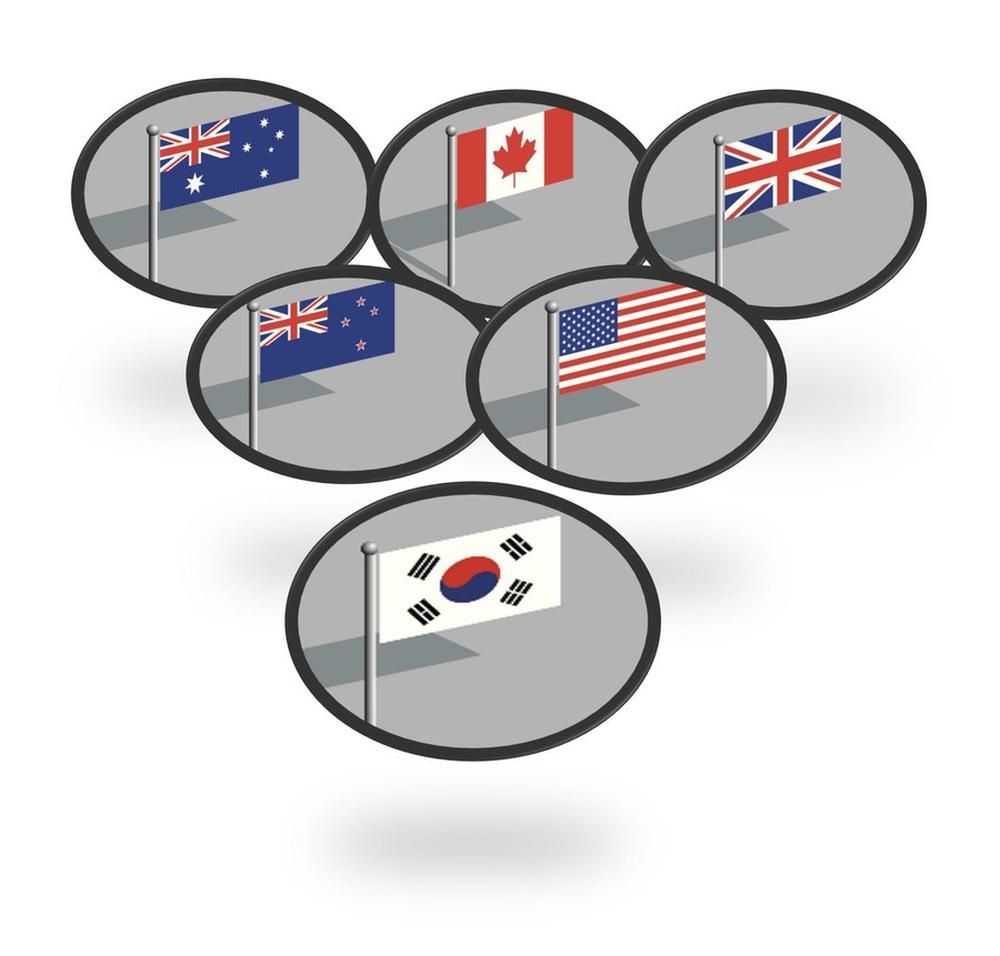- #China
- #Multilateral Relations
- #US Foreign Policy
- #US-ROK Alliance

► South Korea has been mentioned as a potential addition to 'Five Eyes' due to the Biden administration's foreign and security policies regarding the Indo-Pacific region.
► Though joining the program would strengthen ROK-U.S. relations, it would also deteriorate ROK-China relations and place Korea in a precariously tricky situation.
► Before deciding upon anything, South Korea must first understand the facets of 'Five Eyes.'
A revision bill to include South Korea in the Five Eyes, a 75-year-old intelligence sharing network, has been drafted by the US House Subcommittee on Intelligence and Special Operations. The FY22 National Defense Authorization Bill (H.R. 4350) reads, “the committee directs the Director of National Intelligence, in coordination with the Secretary of Defense, to provide a report to the House Committee on Armed Services, the Senate Committee on Armed Services, and the congressional intelligence committees, not later than May 20, 2022, … to expand intelligence sharing with South Korea, Japan, India, and Germany.”
As outlined word by word in the bill, the Director of National Intelligence (DNI) must first review the inclusion of the four nations into the Five Eyes and report the result to the Congress. It may be too soon to speculate whether South Korea will be integrated into the Five Eyes intelligence network at this point in time. Nevertheless, the story has headlined in a couple of South Korean media outlets over the last few weeks. It is not surprising to see such bill in the House during the Biden Administration, which has notably been working to revitalize the alliance network and rebuild U.S.-led liberal international order. To meet this goal, it is important to address the threat “emanating from China and Russia” as the Bill reads.
Although there are multiple U.S.-domestic and within-Five Eyes-group procedures that would decide whether South Korea may be requested to join the Five Eyes, it is ideal for South Korea to think of the implications and significances of joining the group beforehand. In this regard, the rest of the article deals with the following questions: Why did the House Committee on Armed Services include South Korea on the list? And why is South Korea mentioned as the first among the four nations? In addition, what is the procedure for joining the Five Eyes? And finally, what are the benefits and drawbacks for South Korea for joining the Five Eyes? The answers to these questions would provide insight into South Korea’s future with or without the Five Eyes.
The Five Eyes, composed of the five English speaking democracies (U.S., U.K., Canada, Australia, and New Zealand), was formed during the Cold War. This intelligence sharing alliance was formed to monitor the communications of the Soviet Union later widened to cover the entire globe, with a focus on China nowadays, and share classified information among members. In this respect, it is quiet astonishing to see the U.S. House Committee on Armed Services proposing to integrate South Korea, Japan, Germany and India which share different languages. There has been no explanation provided by the House why those particular nations are mentioned in the bill and why, among the four, South Korea is mentioned first.
One theory would be that the House Committee on Armed Services, the majority held by the democratic party, supports the Biden administration’s foreign and security policy devoted to the Indo-Pacific region. The regional and geopolitical goal of the Biden administration in the Indo-Pacific is to deter China’s rise. To meet this goal, the US would need its two key allies in the region, South Korea and Japan, and a member of the Quad, India, to share intelligence and information. Germany has recently sought to play a role in the Indo-Pacific region by sending a frigate to uphold freedom of navigation, FONOP, in international waters. In this respect, the House Committee on Armed Services picked the most logical players to support the Biden administration’s foreign and security agenda. But the question remains, why has South Korea been listed the first? While there has been no explanation about this by the House Committee, most media outlets have already mixed up the order. Thus, the order would not seem important at this point.
The procedure for joining the Five Eyes is complicated. In order for the Biden administration to send an official request to the South Korean government to join the Five Eyes, the DNI, in consultation with the Secretary of Defense, must have positively reviewed the bill proposed by the House Committee. It then reports the result to the three committees mentioned in the bill. If the bill is passed, then it is tried in the Senate and House joint committee then presents it before the full membership of both chambers.
Even if everything is perfectly worked out and President Biden signs the bill, there still is an additional hurdle, the other members of the Five Eyes. Since the Five Eyes deals with the most classified intelligence, the rest of the present members would have to accept the new members. Moreover, variables such as South Korea’s own willingness to provide valuable insights to the Five Eyes and the 2022 U.S. midterm elections scheduled in November may bring drastic alterations to the proposed bill. Considering the expected procedures and hurdles, it may be too premature to anticipate South Korea’s future with or without the Five Eyes.
Instead of arguing for or against the idea of joining the Five Eyes, there are some notable benefits and drawbacks under the hypothetical situation that South Korea joins the group. The benefits are as follows. First, joining the largest and most powerful intelligence network would mean that South Korea is on an equal footing with its members, which are among the most influential on the global stage. Second, joining the U.S.-led intelligence sharing network would definitely reinforce the ROK-U.S. alliance. Third, an influx of essential information regarding the security of the Korean Peninsula can be assumed. On such a positive note, South Korea should be more enthusiastic about joining the Five Eyes. However, there are some drawbacks which may leave South Korea on the fence.
The drawbacks are as follows. First, South Korea-China relations will deteriorate. The relations will be the worst since the THAAD (Terminal High Altitude Area Defense) system was installed. It is extremely predictable when reflecting on Chinese Foreign Minister Wang Yi’s statement during his recent diplomatic visit to Seoul. He said the Five Eyes is “completely a product of the Cold War.” Second, since South Korea is already sharing intelligence with the US based on its alliance, there is no guarantee that both the quantity and quality of information, especially regarding the Korean Peninsula, provided by the Five Eyes would be high-graded. Third, finding an adequate voice and position in a group founded more than half a century ago is difficult. Even after joining the group, both practical and credibility issues would remain for a certain time.
Considering the benefits and drawbacks mentioned above, would it be the right choice for South Korea to join the Five Eyes? According to Gilbert Rozman, middle power is an indispensable partner of a single great power to sway other great power’s behavior. In this regard, for South Korea, the decision of joining the Five Eyes may be the same old game of choosing between the two great powers. Nonetheless, as long as it remains a security-focused, not a political, network, South Korea should think deeply about joining the Five Eyes when the time comes. One caveat, South Korea must first understand what the Five Eyes truly is.
Dr. Lee is an associate research fellow at the Korea Institute for Defense Analyses (KIDA). Prior to his current position at KIDA, Dr. Lee was a Global Korean Studies (GKS) research professor at the Division of International Studies (2019) and a research professor at the Ilmin International Relations Institute (2015~2019) of Korea University. His research interests have been focused primarily on the issues of international security, ROK-US alliance, US-China relations, and US foreign and security policy. He recently authored and co-authored Trump Administration’s Security and Defense Policy on China (KIDA Press, 2020) and “South Korea and the 2016 US Presidential Elections: A Security-Trade Nexus Redefined?” in American Presidential Elections in a Comparative Perspective: The World is Watching (Lexington Books, 2019). Dr. Lee holds a B.A. in International Relations and Asian Studies from Lehigh University located in Pennsylvania, received a Global M.B.A. from Business School and a Ph.D. in International Relations from the Graduate School of International Studies (GSIS) of Korea University.

